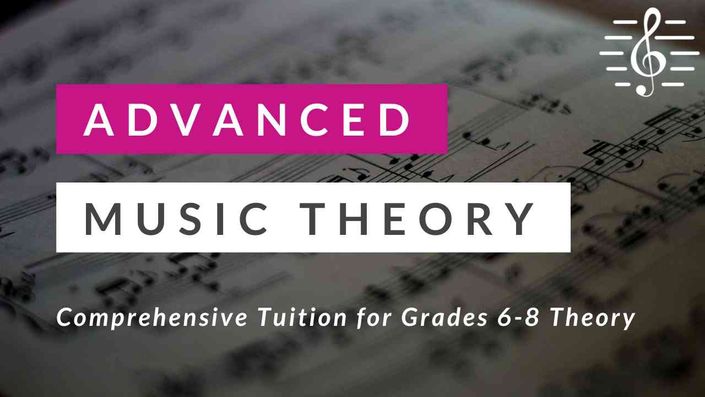
Advanced Music Theory
Learn advanced music theory with this comprehensive course, the complete guide to Grades 6, 7 and 8 theory.
Enroll in Course
What You Will Learn
Establish a toolkit of musical expertise with the Advanced Music Theory course.
Move beyond the basic language of music theory and learn more advanced techniques combining multiple aspects of harmony, figured bass, analysis and melody writing to produce successful workings in a variety of styles. This course features clear explanations relating to harmonic language, including chromatic chords, and the rules of harmony are explored in detail. Many worked examples give insights into the process of writing harmony, realising figured bass, melodic composition and analysis. The course is full of helpful tips for students concerning what works well and what to avoid. As well as being suitable for candidates preparing for ABRSM grades 6, 7 and 8 music theory exams with the complete syllabus covered, this course also provides an excellent resource for anyone wishing to develop advanced music literacy skills. During the Advanced Music Theory course we'll cover...
- Harmonic Vocabulary - How do diminished 7th, neapolitan 6th and augmented 6th chords function? What are the other chromatic chords and how do you use them? How do you know which chord will work best?
- Four-part Writing - What are the essential principles of writing good harmony? How do you deal with suspensions and dissonance? How do you write more effective harmony?
- Figured Bass - How does the system work? What are the abbreviations? How do you realise a figured bass keyboard part in the most effective technical and stylish ways?
- Melody Writing - What are the principles of good melodic design? How do you tackle modulation? What is the best way to compose and structure a melody?
- Score Analysis - How do you identify the underlying harmonic structure, identify intervals, devices, and deal with transposing instruments? Which details give you clues to the style and performance of the piece? How do you analyse a large score complete with voices, instruments, ornaments and multiple parts?
I haven't looked at (much less attempted) figured bass since 1981. At that time, I came away with a very basic "theoretical" idea of how figured bass worked. In (just under) 30 minutes, you've expertly explained and then demonstrated the true logic and mechanics such that it now makes perfect sense. Thank you so much!
- Carl

Who Is This Course For?
Music students and higher grade examination candidates.
Many students struggle to grasp harmony, figured bass, melody writing and analysis from text books. Students also often describe the difficulty in finding an experienced teacher with the right expertise who can explain and demonstrate the knowledge needed with clarity. The advanced music theory course is the answer. It shows you how to apply theoretical techniques in an accurate and creative way, providing you with a professional command of the requirements to achieve a high level of success. It is ideal for students preparing for grades 6, 7 and 8 music theory examinations, as well as an excellent resource for students looking to learn more challenging theory concepts and the fundamentals of good harmonic and melodic writing.
Do any of these sound familiar?
"I want to take one of the high-level theory exams..." "I want to study music at college or university and would like a head start..." "I know the basics of music theory but want to know how to apply it all at a more advanced level…" "I can compose musical ideas but I want to structure them more successfully and to be more confident with my melody writing and harmonic skills..." "I want to get better at hearing what I am writing and at converting what I hear in my head into accurate notation…"
↓
Thank you for this brilliant course. Your content has enabled me to access a subject area that previously felt inaccessible. I’m excited to begin writing harmonies myself based on your clear, expert tuition. Thanks again.
- Caroline

By the end of the Advanced Music Theory course you'll be able to…

Choose suitable chords, deal with advanced chromatic chords and write good four-part harmony

Work with figured bass and easily complete trio sonata and basso continuo exercises

Compose melodies and write for all instruments in a variety of styles

Analyse and answer questions in relation to scores, including chord identification, suggested composers, realisation of ornaments, dealing with transposing instruments, modulations and other contextual elements

Write music with enhanced detail without needing access to your instrument

Confidently sit any of the high-level, grade 6, 7 or 8 theory exams
Just the right pace of content for a lapsed piano player now returning to enjoy it as a senior citizen after refreshing basic theory with your grade 5 theory course - thank you! Nice to tap into your experience with likelihood of chord progressions and embellishments with additional passing note once all the harmonic chords have been worked out.
- David

Course Information
What's Included with the Advanced Music Theory Course?
Professional Teaching
You'll receive expert tuition, making it easy to follow, digest and internalise all the important concepts of advanced music theory.
Practical Exercises
Each video teaches you the method for effective writing and then follows it by relating it to working example questions.
Ask Questions
Below each video you are able to post comments and ask questions should you have any in regards to the course topics covered.
Easy to Follow Structure
The course is divided into multiple stages, breaking down each part separately before putting it all together.
Complete at Your Own Pace
You can easily fit the course around your regular commitments, completing it at your own pace and in your own time.
Anywhere Access
Your course never expires. Learn when and where you choose! Computer or mobile. Just get comfortable and dive in!
↓
Your Instructor

Hi, I’m Gareth and I'm passionate about developing ‘the all round musician’.
Over 35 years of music examining with ABRSM, work with the BBC on Radio and TV, experience on the international concert platform, as a published composer and arranger, have brought rich resources to the 40 years of teaching in which I've engaged.
Scholarships at The Royal College of Music, Oxford University and St. Paul’s Cathedral gave me fantastic opportunities to learn from the best musicians, scholars and teachers. Working as Director of Music at Queen Elizabeth Grammar School then provided a wonderful opportunity to develop my teaching skills.
Teaching individuals and groups of all ages, and at all stages of development have refined a teaching approach that I hope is fun and engaging, and focused on explaining things clearly and logically. And that is what these courses are all about - understanding the basic principles with clarity, then going deeper, applying them to your musical life and liberating yourself as a musician.
It’s a rich and amazing journey, and I can’t wait for you to join me today!
Course Curriculum
-
PreviewLesson 1 - Harmony (52:54)
-
StartLesson 2 - Chords (33:30)
-
StartLesson 3 - Figured Bass (26:21)
-
StartLesson 4 - Diminished 7th Chords (21:24)
-
StartLesson 5 - Neapolitan 6th Chords (9:45)
-
StartLesson 6 - Augmented 6th Chords (22:49)
-
StartLesson 7 - Other Chromatic Chords (20:16)
-
StartLesson 8 - Dissonance & Suspensions (27:01)
-
StartLesson 9 - Writing Effective Harmony (53:26)
-
PreviewLesson 10 - Melody Writing (44:52)
-
PreviewLesson 11 - Figured Bass Exercise 1 (27:08)
-
StartLesson 12 - Figured Bass Exercise 2 (26:42)
-
StartLesson 13 - Figured Bass Exercise 3 (28:05)
-
StartLesson 14 - Analysis Exercise (22:55)
-
StartLesson 15 - Melody Writing Exercise 1 (16:55)
-
StartLesson 16 - Melody Writing Exercise 2 (22:06)
-
StartLesson 17 - Melody Writing Exercise 3 (12:18)
-
StartLesson 18 - Working From A Score Outline (26:28)
Frequently Asked Questions
A Letter from Gareth Green
MA (Oxon), MA (Leeds), FRCO(CHM), FLCM, ARCM
Many students of music want or need to pass music theory exams and this course is very focused on enabling you to achieve that.
At the same time, theory is about much more than passing exams. Have you ever wondered what it would be like to get inside the mind of a composer? Think of a piece that you’re working on or listening to at the moment. What inspired the composer to write it? When did the composer live and what are the features of musical style at that time? Then what did the composer need to think about in order to compose the piece?
Theory explores the ingredients that bring music to life and, contrary to the idea held by some that theory kills creativity, it’s theory that enables musicians to make sense of their musical ideas.
If we go back in time music was in the world well before anyone dreamt up music theory. So do we really need theory? After all, we can all enjoy music without needing to understand the nuts and bolts. Some musicians have the ability to perform and improvise without completely understanding the theory behind what they are doing. I can manage a few words and phrases in Italian but because I understand more grammar and vocabulary in French I get on much more successfully in French than I do in Italian. Because I understand even more grammar and vocabulary in my native tongue I get on considerably better in English than I do in French. The more we understand of a language, the more fluent we become, and music is often described as a language.
The interesting thing is that music theory was taken very seriously as far back as the time of the Ancient Greeks, who were keen to explain how music worked and to establish why certain approaches were more successful than others. Ever since, theory has continuously evolved to keep pace with explaining musical development.
Having taught music for over 40 years, my experience is that the more students understand theory, the more they understand and appreciate the music they perform, and the more excited, creative and engaged they become.
Don’t learn theory for the sake of learning theory. Engage with music as a listener, a performer, and/ or as a composer then grasp the theory that will equip you to reach your full potential as a musician. That’s what makes music theory so exciting! Enjoy!
— Gareth Green, Music Matters




